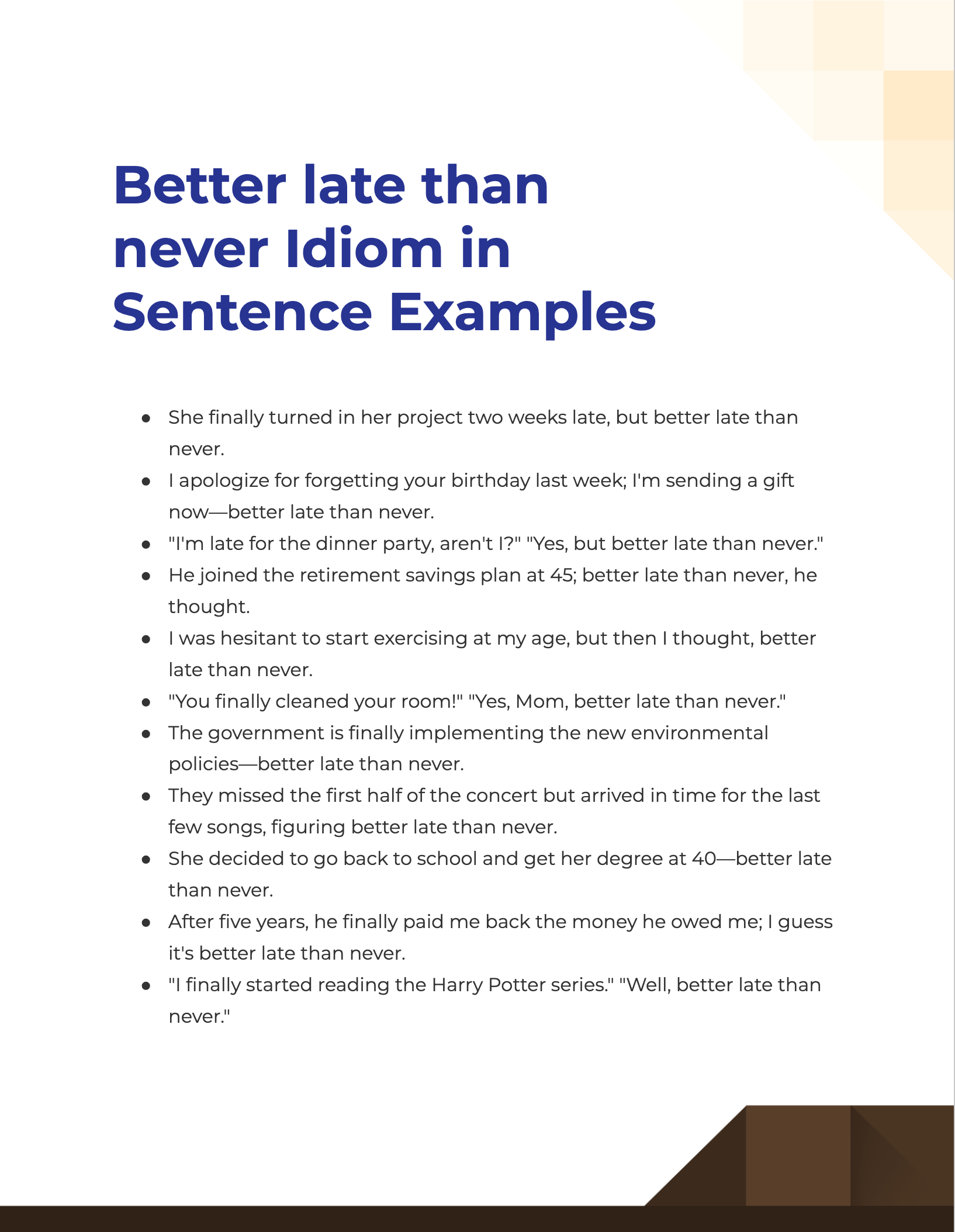Better late than never Idiom
The phrase “Better Late Than Never” has permeated everyday language, but what does it truly signify? In this comprehensive guide, we unpack the meaning, origins, and practical uses of this popular idiom. Learn how to incorporate it naturally into your conversations and writing, supported by diverse idiom examples.
What is the Better late than never Idiom? – Definition
“Better Late Than Never” is an idiom that suggests it’s preferable to do something late, rather than never doing it at all. It offers a lens through which tardiness can be viewed as a lesser evil compared to complete inaction.
What is the Meaning of Better late than never Idiom?
This idiom implies that taking action or making an effort, even if delayed, is still preferable to neglect or inaction. It serves as an acknowledgment that while timeliness is important, the act of completion holds its own significance.
Origin of Better late than never Idiom
The origin of the phrase “Better Late Than Never” can be traced back to ancient times and has been attributed to various cultures. One of the earliest recorded usages is in Geoffrey Chaucer’s “The Yeoman’s Tale,” part of “The Canterbury Tales,” written in the late 14th century. However, similar expressions exist in multiple languages, highlighting its universal appeal.
20 Best Sentence Examples with Better late than never Idiom

- She finally turned in her project two weeks late, but better late than never.
- I apologize for forgetting your birthday last week; I’m sending a gift now—better late than never.
- “I’m late for the dinner party, aren’t I?” “Yes, but better late than never.”
- He joined the retirement savings plan at 45; better late than never, he thought.
- I was hesitant to start exercising at my age, but then I thought, better late than never.
- “You finally cleaned your room!” “Yes, Mom, better late than never.”
- The government is finally implementing the new environmental policies—better late than never.
- They missed the first half of the concert but arrived in time for the last few songs, figuring better late than never.
- She decided to go back to school and get her degree at 40—better late than never.
- After five years, he finally paid me back the money he owed me; I guess it’s better late than never.
- “I finally started reading the Harry Potter series.” “Well, better late than never.”
- We were late to the wedding, but we made it for the vows, so better late than never.
- He finally proposed to her after dating for ten years—better late than never, she thought.
- After years of delays, the company finally launched its new product, adhering to the principle of better late than never.
- They finally fixed the potholes on my street, and all I could think was better late than never.
- “You’re late to the trend; everyone’s moved on to new social platforms now.” “Better late than never, I guess.”
- He only started investing in his health at 50 but quickly realized that it was better late than never.
- She was the last one to finish the marathon, but she proudly thought, better late than never.
- The city’s new recycling program was a long time coming, but it’s better late than never.
- He didn’t start taking guitar lessons until he was in his 30s, but he always believed in the mantra, better late than never.
More Famous Idioms with Meaning, Sentence Examples
- Play It by Ear Idiom
- In Black and White Idiom
- Crocodile Tears Idiom
- Full of Beans Idiom
- Busy as a Bee Idiom
- Snake in the Grass Idiom
- Once in a blue moon
- Break a leg Idiom
- Beat around the bush Idiom
- Bite the bullet Idiom
- Through thick and thin Idiom
- Actions speak louder than words Idiom
- Go down in flames Idiom
- Jump on the bandwagon Idiom
- Call it a day Idiom
- It takes two to tango Idiom
- A blessing in disguise Idiom
- Come rain or shine Idiom
- On cloud nine Idiom
- Hit the sack Idiom
- Go the extra mile Idiom
- The Whole Nine Yards Idiom
- A penny for your thoughts Idiom
- Pull someone’s leg Idiom
- As right as rain Idiom
- Ignorance is bliss Idiom
- Throw caution to the wind Idiom
- Kick the bucket Idiom
- Take a rain check Idiom
How to Use “Better Late Than Never” Idiom in Sentences?
The idiom “better late than never” is commonly used in both spoken and written English to imply that it’s preferable for something to happen later than planned, rather than not happening at all. Understanding how and when to use this idiom can make your language more engaging and nuanced. Here are some tips on how to use this idiom effectively in your sentences:
Incorporate the Idiom in Various Situations
This idiom is versatile and can be used in many contexts, from business to personal relationships to daily chores. Use it when you want to express relief or acceptance for something that has finally occurred, even if it’s later than expected.
Pair with an Explanation or Action
To provide additional context, you can use the idiom in conjunction with an explanation of what is late but is now happening. For example, “I finally submitted my application for the job—better late than never.”
Use as a Standalone Response
The idiom can be used by itself as a complete thought in conversations. If someone apologizes for being late, you can simply reply with, “Better late than never.”
Placing Emphasis
For added emphasis, you can place the idiom at the beginning of the sentence. For example, “Better late than never, they finally approved the project.”
For Both Positive and Negative Scenarios
While often used to relieve tension or make light of a situation, the idiom can also reflect frustration or disappointment. For instance, “They finally called me back for an interview—better late than never, I guess.”
Tips for Using “Better Late Than Never” Idiom
Understand the Tone
The idiom can be used both sarcastically and sincerely. Pay attention to the context and your tone of voice when using it, so your meaning is clear.
Don’t Overuse
Although it’s a handy expression, using it too frequently can make your language seem repetitive. Use it when it adds value to your statement.
Combine with Other Phrases
You can use “better late than never” alongside other idiomatic expressions or proverbs to enrich your language. However, make sure the expressions don’t contradict each other.
Be Mindful of Your Audience
While this idiom is well-known, not everyone may understand it, particularly if English is not their first language. Be prepared to explain the idiom if needed.
Use it in Different Forms of Communication
The idiom works well in both formal and informal situations. You can use it in emails, articles, speeches, and casual conversations.
By following these guidelines, you can effectively incorporate the “better late than never” idiom into your language and enhance your communication skills.



